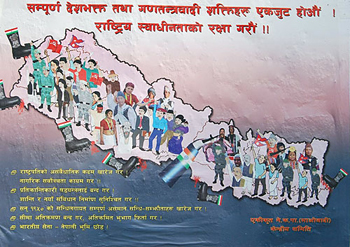ONLINE EXCLUSIVE
 The Maoist party's fourth round of protests targeted alleged Indian interference in Nepal |
India continues to be doubtful of the Maoist commitment to multiparty democracy and would like to see actual proof of their transformation into a normal non-violent political party. The recent 'national awareness' campaign has sowed further suspicions about whether the Maoists will be sensitive to India's security and commercial concerns.
The establishment believes that the Maoists must dismantle their coercive apparatus and renounce violence as the first step to any political settlement. This would entail settling the PLA question in a way whereby most combatants are absorbed into civilian life, and dismantling the paramilitary structure of the YCL. The integration issue is seen not as much as a question of numbers as that of intent. A question that is asked is: if the Maoists are indeed committed to becoming a democratic party, why do they want their people to be sent to the army?
India is skeptical of the Maoist phraseology of 'multiparty competition', and would prefer them to make a clear commitment to multiparty democracy. In this view, the issue of the democratisation of the Maoists need not be linked to power-sharing. Instead, the present 'democratic alliance' must stick together and force the Maoists to change.
India has also conveyed to the Maoists the message that that its anti-India campaign could set into motion a chain of events that would not be under anyone's control. Protests by locals in bordering Indian towns against the desecration of Indian national symbols by the Maoists were cited as proof of the hardening of Indian public opinion. India has also taken the obstruction of the Upper Karnali project by the Maoists very seriously, with officials privately warning Maoists of potential consequences.
There is a sense here that non-Maoist political parties will not be willing to take the Maoists at face value anymore. Unless the Maoists abide by their past promises, the coming months could see rising confrontation and violence.


